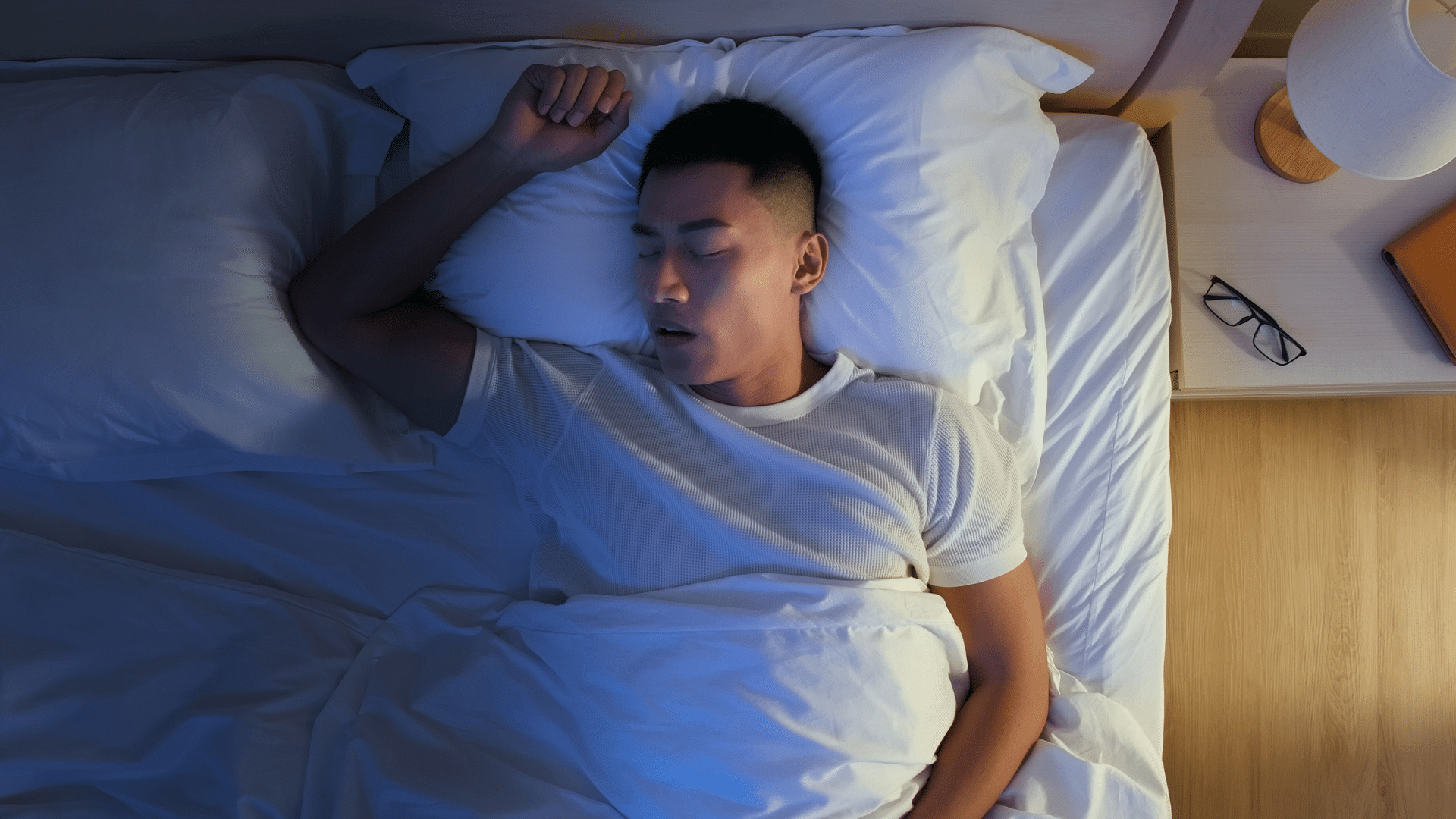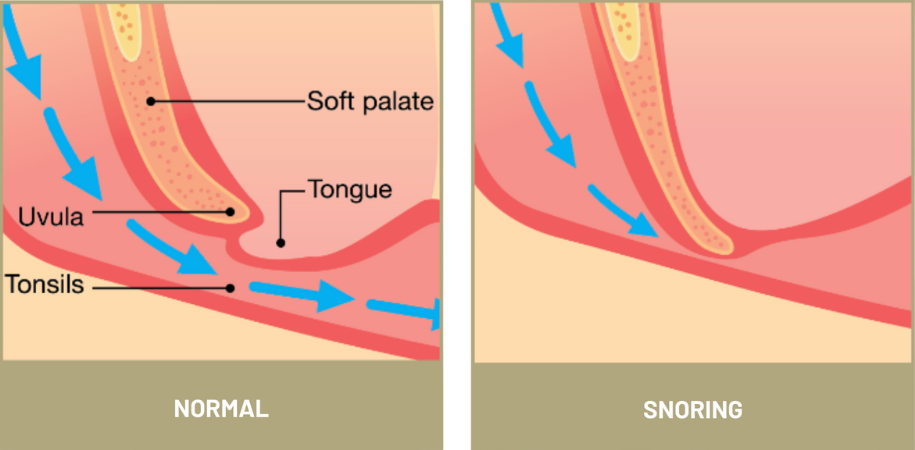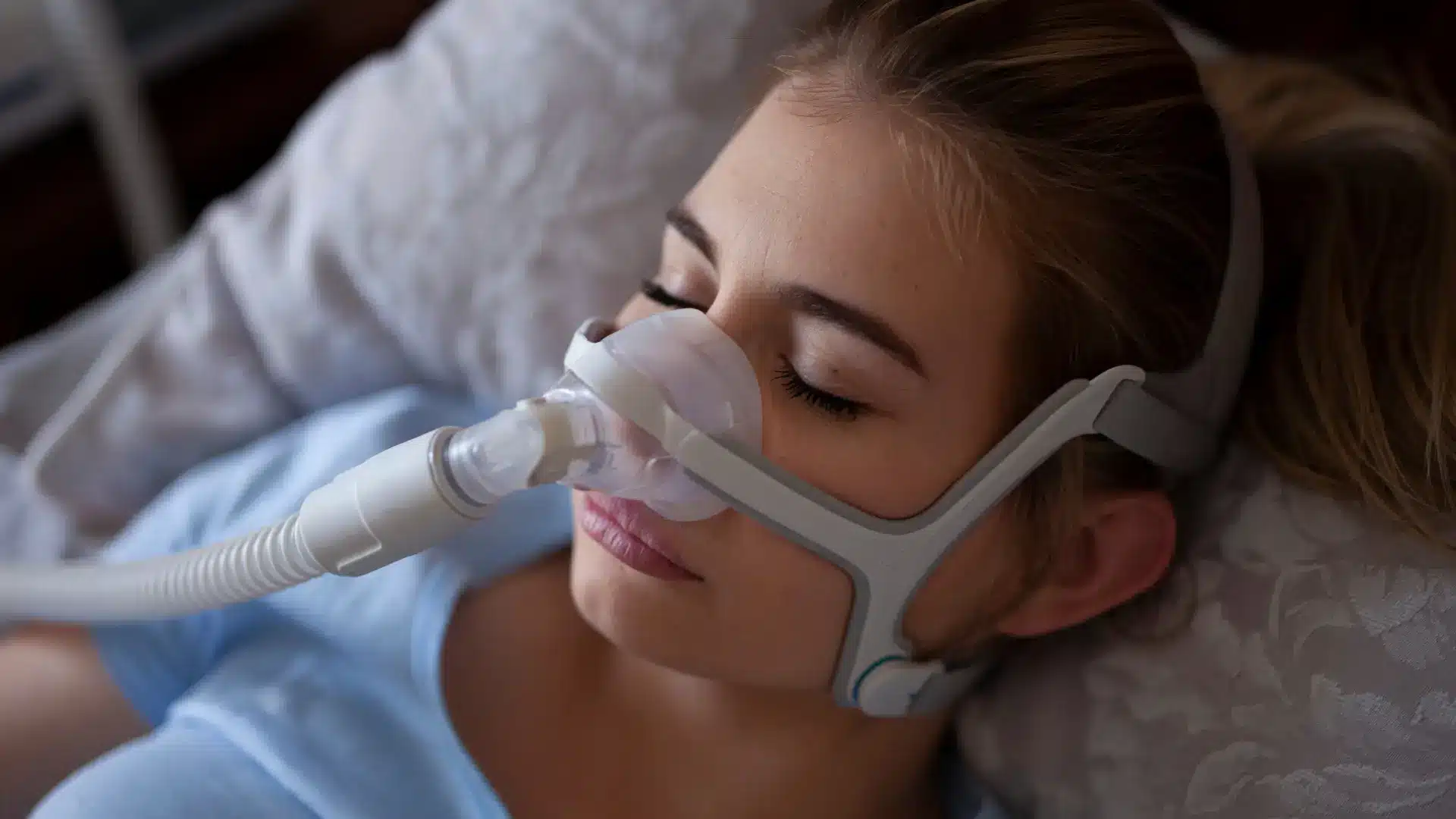
Snoring is a common experience that occurs when airflow is partially blocked during sleep. Loud and frequent snoring can be disruptive and annoying, and in some cases may signal conditions like sleep apnoea.
In this article, we discuss the common causes of snoring before offering a range of effective solutions—from lifestyle changes and home remedies to medical treatments.
Learn more about the link between snoring and sleep apnoea and read through our frequently asked questions.
What causes snoring?
Snoring occurs when your airway becomes blocked during sleep, causing the tissues of your throat and nasal passages to vibrate. Factors like poor sleeping posture, nasal congestion, smoking, alcohol, sedatives, and weakened throat muscles all contribute to the likelihood of snoring by narrowing the airway or relaxing the muscles in your throat.
- Awkward sleeping positions such as sleeping on your back can cause narrowing of the airway
- Colds and allergies can cause nasal congestion, blocking the airway and forcing you to breathe through your mouth
- Smoking causes irritation, inflammation and swelling that narrows the airway and triggers snoring
- Excessive alcohol consumption relaxes the muscles of the throat, making it more likely to vibrate while you sleep
- Sedatives also relax the throat muscles and increase the chance of airway obstruction and snoring
- Throat muscles weaken with age or certain conditions, meaning they collapse more easily during sleep, leading to snoring

Best ways to stop snoring
There are several ways that you can mitigate the effects of snoring, from lifestyle changes and home remedies to medical treatments and products. We discuss some of these suggestions in more detail below.
Lifestyle changes
Sleep position
One of the easiest lifestyle changes to help prevent snoring is adjusting your sleep position. While there are many benefits to sleeping on your back, it can contribute to snoring by causing the tongue and soft palate to fall backward. Try sleeping on your side to open your airway. Many people find this adjustment easier with a body pillow or knee pillow.
You may benefit from an adjustable bed base that raises the head, keeping the airway open and reducing pressure on the throat. An adjustable base or electric bed is an effective, non-invasive solution for reducing or preventing snoring.
Sealy Posturematic® adjustable bed base
Experience comfort at a new angle
The Sealy Posturematic® Adjustable bed base is a functional solution for modern bedrooms. Includes an anti-snore angle for easier breathing.
Diet and alcohol
Diet changes and increased hydration can also help to mitigate the severity of your snoring. Drinking plenty of water, avoiding processed food and lowering dairy consumption can reduce the amount of mucus in the nose and throat and keep the airway clear. Similarly, cutting back on alcohol or sedatives is also likely to help with snoring. These substances relax the muscles of the throat, and many people find that they snore louder or more frequently after indulging in alcohol in particular.
Weight management
A more long-term solution to reduce snoring is weight management. While not every case of snoring is caused by excess weight, it is a well-known contributor to the issue. The extra tissue around the neck puts pressure on the airway and increases the likelihood of airway obstruction. Some people may see a reduction in snoring by losing even a small amount of weight.
Home remedies & exercises
Steam inhalation & nasal rinses
Steam inhalation and nasal rinses are popular at-home remedies for snoring. These solutions flush out irritants, loosen mucus and open nasal passages. Reducing congestion and blockages in these ways can clear the airway, and are especially helpful if your snoring is a result of a cold or allergy.
Nasal strips & nasal dilators
Many people find their snoring is reduced by the use of nasal strips, which stick to the outside of the nose and widen the nostrils. Nasal dilators work in a similar way inside the nostrils. Pulling open the airway can improve airflow through the nose and reduce the need to rely on breathing through the mouth.
Throat & tongue exercises
Those who snore as a result of weakened throat and tongue muscles may benefit from engaging in a series of exercises. Examples include repeating vowel sounds or running the tongue along the roof of the mouth. Consult with your health professional for more activities that strengthen the tongue, soft palate and throat.

Medical treatments
CPAP Machines for sleep apnoea
For some people, snoring can be a sign of sleep apnoea. We discuss this condition in more detail below. For sufferers of sleep apnoea, a CPAP (Continuous Positive Airway Pressure) machine can reduce the severity of snoring, or eliminate the problem altogether in some cases, by delivering a continuous stream of air into the user’s mouth, nose, or both. In doing so, a CPAP machine helps to keep the airway open.
Surgical options
There are some surgical treatments that can help with snoring. One example is a UPPP procedure (Uvulopalatopharyngoplasty), which opens the airway by removing tissue in the throat. Surgical treatments are typically considered for snoring when other treatments and remedies offer insufficient relief.
Snoring and sleep apnoea
Sleep apnoea is a condition that affects roughly 1 billion people worldwide. The cause of sleep apnoea may be genetic with a family history of the condition, or it may be caused by other factors. These include obesity, enlarged tonsils, ageing, and some health disorders.
Sleep apnoea is characterised by breathing that stops and starts continually during sleep, and is often linked to snoring. Snoring is a result of relaxed muscles or partial blockages in the throat that narrow the airway and cause vibrations as air passes through. In obstructive sleep apnoea, however, the vibration and noise increase, until finally the airway is sucked shut. These repeated blockages lead to pauses in breathing, and sufferers of sleep apnoea will commonly experience gasping or choking in addition to loud, frequent snoring.
Other symptoms of sleep apnoea include daytime fatigue, morning headaches and dry mouth, mood changes, and reduced quality of life. Because it disrupts oxygen flow and impacts sleep quality, sleep apnoea may also increase the risk of serious health problems like high blood pressure, heart disease and stroke.
This condition is managed by the use of a breathing device (like a CPAP machine or mouthpiece), medication, surgery, and lifestyle changes such as sleep positions and weight management. The right treatment is dependent on the cause and should be assessed by a sleep study or healthcare professional.
When to see a doctor
If your snoring is severe, consistently loud and disturbing, or accompanied by gasping or choking sensations, you may have sleep apnoea. Even if you do not suspect that you have this condition, persistent and loud snoring should be evaluated by a doctor to rule out any underlying health concerns or sleep disorders.

Key summary
Snoring happens when air can’t flow freely during sleep, causing throat tissues to vibrate
Common triggers include back sleeping, nasal congestion, alcohol, smoking, and muscle relaxation
Sleeping on your side or elevating your head can help keep airways open
Staying hydrated, eating well and reducing alcohol consumption may reduce snoring
Simple tools like nasal strips or steam inhalation can improve airflow, along with throat and tongue exercises
Loud, frequent snoring may signal sleep apnoea and should be assessed by a healthcare professional
FAQs on snoring
How do I make my snoring go away?
Resolve snoring by sleeping on your side; staying hydrated; eating well and reducing alcohol consumption; managing your weight; and trying at-home remedies like steam inhalation or nasal strips. You may also need to consider surgical options or a CPAP machine.
What's the fastest way to stop snoring?
The fastest way to stop snoring is to try a range of lifestyle changes: try sleeping on your side; staying hydrated; eating well and reducing alcohol consumption; managing your weight; and trying at-home remedies like steam inhalation or nasal strips.
Why do I snore so badly?
Snoring is caused by a number of things, including awkward sleeping positions, smoking and alcohol consumption, nasal congestion, and weakened throat muscles. Snoring may also be a symptom of sleep apnoea, which can be caused by weight gain, enlarged tonsils, ageing, or a family history.
Can snoring be cured naturally?
Snoring may be resolved naturally with some lifestyle changes: try sleeping on your side; staying hydrated; eating well and reducing alcohol consumption; managing your weight; and trying at-home remedies like steam inhalation or nasal strips.
Can I train myself to stop snoring?
You can resolve snoring with some lifestyle changes: try sleeping on your side; staying hydrated; eating well and reducing alcohol consumption; managing your weight; and trying at-home remedies like steam inhalation or nasal strips.
Do snoring strips work?
Snoring strips or nasal strips pull the nostrils open, widening the airway. This improves airflow and reduces mouth breathing, which resolves snoring in many people.
